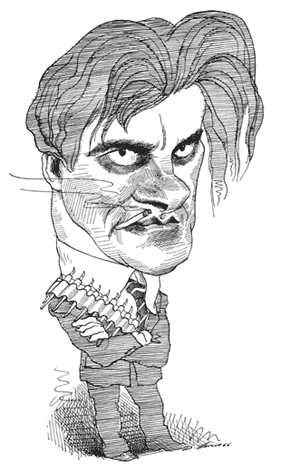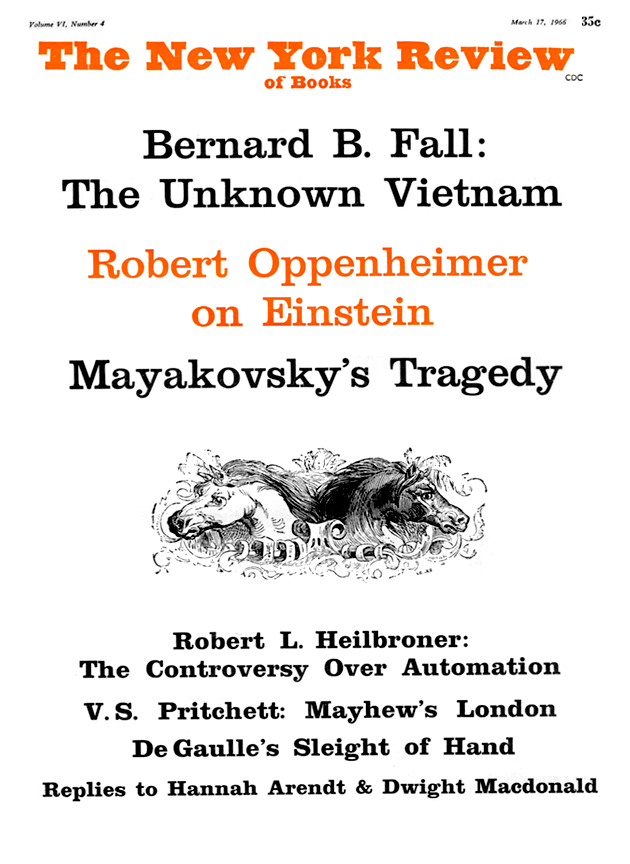Mayakovsky entered Russian literature in 1912. He left it eighteen years later, on the 14th day of April 1930 when at 10:15 in the morning he shot himself through the heart. Had he lived another three months, he would have been, on the 7th of July, thirty-seven years old. His death was shocking; it roused all kinds of rumors. And yet it might have been, though it was not, foreseen. Only in retrospect did it seem consistent with his tragic, willful life. For though the theme of suicide kept recurring in his poems, it was too grotesquely treated to be taken seriously. And had he not, on other occasions, played Russian roulette and been spared by Fate? He had always conducted himself with mystifying mock-seriousness and jocular solemnity. Exaggeration was his characteristic style. The images of torment and cries of pain that filled his poems were simply mannerisms, it seemed, and technical devices, like the preposterous gestures and outlandish costumes he affected, and the huge voice he cultivated to impress his audiences. His laughter was immense, his satire broad, and his show of tragedy, a mask he wore in the vaudeville act he made of his life. The end revealed the opposite to be the truth: The tragic mask was not a mask, but the face itself; and comedy, not tragedy, was what Mayakovsky had always played with in a desperate attempt, no doubt, to make light of suffering, to burlesque the demands of an insatiable ego by means of ludicrous hyperbole.
He spent his life strutting in the role of rebellious hero on a stage of his own making; and the epoch into which he was born made his performance more appropriate than it could have been at any other time. Protest and propaganda were in the air. The stance of rebellion was full of meaning. Tradition was the universal enemy. Violence, overthrow, and brutal reconstruction were the order of the day. Mayakovsky fulminated against the ideals, forms, and establishments of the past—political, religious, ethical, aesthetic. In 1905, at the age of twelve, in his native Georgia, he led his classmates in revolutionary demonstrations; two years later, in Moscow, he attached himself to an underground group of Bolsheviks, was arrested, put under surveillance and, the following year, clamped into jail. During his imprisonment, with leisure to do some reading, he decided that he too could write but that what he had to say required fresh words, constructions, and rhythms; and once released, announced to a comrade that he “wanted to create a Socialist art.” In 1912 he joined the artist David Burlyuk and the poets Velemir Khlebnikov and Alexei Kruchonykh in producing a manifesto entitled A Slap in the Face of Public Taste, which proclaimed the determination of these Futurists to “throw overboard” the most renowned Russian authors, both living and dead, and build a new art needed by a new age. There followed a Futurist lecture tour that scandalized, amused, and provoked audiences all over Russia into an exasperated curiosity about innovations in poetry and art.
FROM THEN ON Mayakovsky labored stupendously, molding himself in the image of a Socialist Hercules. Large of stature, he called himself a giant; endowed with unusual energy, he transformed himself into a one-man factory, “a factory without chimneys,” he said, but it was “harder without chimneys.” He was an artist before becoming a poet, a skilled caricaturist and one of the first abstract painters in Russia; and when the war broke out and he was rejected by the army as “politically unreliable,” he continued his work in both media, exhibiting his paintings and, in 1915, completing his first long poem, “A Cloud in Trousers,” in which he transformed the altogether private misery of unhappy love into a wholesale indictment of his world. He wanted, above all, to wipe out sentimentality from both the sense and the shape of poetry, to do away with easy harmonies and sticky commonplaces, to supplant lilting cadences and sweetish sounds with crude, angular, unvarnished rhythms. Pettiness and prettiness had to be drowned in the gigantic vastness of his passions, which embraced the universe and all mankind. No boundaries might contain, nor any harmony express them. And there is certainly no heavenly music in his poems, rather the sound of worlds in explosion. Laconic and grotesque, whatever their themes, they are always distortions, the verbal equivalent of his cartoons. Everything in Mayakovsky’s work is made to look absurd—large and small events, public and private affairs, minor errors and great tragedies. Everything is fantastically ridiculous, but not exactly laughable. Horror is mixed with laughter, anguish with burlesque; and the ludicrous parades with a kind of ponderous majesty. It is a unique amalgam of mockery and exaltation, of straight-forwardness and obliquity, of self-concealment and self-revelation.
With the Bolshevik revolution, Mayakovsky came into his own, found, that is, a public demand for his private disaffection. The new government could use such gifts as his: his energy, his mockery, his capacity to hold large audiences. From private rebel Mayakovsky became a public servant. The one-man factory worked day and night; its production was phenomenal. There were the famous ROSTA days when, as paper and printer’s ink were in short supply, the Russian Telegraphic Agency in Moscow turned its windows into newspapers. Mayakovsky placarded them with posters on every conceivable subject: news from the front, advice about health and hygiene, official proclamations, advertisements, anti-religious propaganda, patriotic appeals—all done in the form of cartoons with accompanying jingles. The work was absorbing and exhilarating. Mayakovsky was proud of it, proud of his usefulness, of his prodigious output: drawings in the thousands, rhymes by the hundred, fabricated on demand for whatever the state required. In addition, he wrote longer pieces: history in the form of caricature, like “War and the Universe” and the play Mystery Bouffe; Gargantuan fantasies, like “An Extraordinary Adventure,” in which the sun accepts Mayakovsky’s invitation to drink tea with him; contributions to the war effort, like “Left March,” written for the Red Marines at the time of the Allied intervention; satire on the machinery of government, like “In Re Conferences,” of which Lenin remarked that he did not know about it as poetry, but as for politics, it was absolutely correct.
Advertisement
ALL THESE had to do with public affairs. But Mayakovsky was also compelled, by the decree of his own intimate being, to write about himself. And while in his public themes he was commander and legislator, ordering men about, in the personal ones he was a pleader. In “A Bargain Sale” he offers to trade all that his “spirit owns and treasures,” his “magnificence,” his “immortality,” for “just one, tender, human word”; in “The Backbone Flute” he writes of raging, helpless jealousy, “nailing himself to paper with the nails of words”; “I Love” is an attempted self-portrait and autobiography; “Man” a reiteration of his readiness for martyrdom, and “About This,” one of the most anguished and bizarre love poems ever written, an extravaganza of metaphors transmogrified into reality. But Mayakovsky’s appeals are as thunderous as his commands; he does not beg, he roars, for sympathy. It is a tragic bouffonade that reveals, for all its power, a kind of adolescent misery, suspended between self-aggrandizement and self-disparagement, between stoicism and selfpity, between a show of strength and a cultivation of weakness—all of which does not lessen the effect of pain nor cast its genuineness in doubt, and the pain is especially poignant because Mayakovsky feels himself under constant obligation to justify his speaking of it. What right has a poet, committed to great public issues, to dwell on loneliness and unrequited love? It was impressed on Mayakovsky that he had no right, and his entire work is a record of a cruel conflict between the man and the actor, between the public figure who is not allowed to suffer and the private one who is always in pain. The tension is felt throughout, not only in the public-private alternation of his poems but in the poems themselves, from one of his earliest lyrics:
On the trampled pavements of my soul the footsteps of madmen bang
hard phrases of heels…
to the unfinished “At the Top of My Voice,” from which he read at his last public appearance three weeks before his death:
I’m fed to the teeth with agit-prop, too.
I’d like to scribble love-ballads for you.
They’re profitable charming and halcyon.
But I mastered myself, and crushed under foot
the throat of my very own songs.
Herbert Marshall’s anthology gives a sampling of Mayakovsky in all his moods. It includes a variety of brief lyrics; “agit-poems” of the ROSTA period; “A Cloud in Trousers” and “About This”; the terse autobiographical prose sketch, “I Myself”; the turgid “Vladimir Ilich Lenin”; and also some excellent reproductions of his drawings, several little known photographs, copies of first editions, and in an appendix, poems to him and about him by his friends Nikolay Aseyev, Boris Pasternak, and Anna Akhmatova, and by his follower and imitator Yevtushenko. All of this brings to life the look and feel of Russia in the first two decades of this century, and shows how closely Mayakovsky was involved in its intellectual and artistic, as well as its military, upheavals. The editor’s introductory essay verges on idolatry, and his selection, like Mayakovsky himself, is undiscriminating. Its merit is its fullness—a complete picture of Mayakovsky, both at his best and at his worst, in all those contradictory aspects that make him seem a clown to some and a hero to others. It is as complete a picture as can be had in English at the present time of this unusual human being whose work, in its totality, is a remarkable self portrait, and of this unequal poet, whose reputation keeps rising and falling but whose originality cannot be doubted, although its value, like that of many brash experiments of his day, may be questioned. The effect of his compact, blunt style on Russian writing may be shown, in time, to be something like that of Hemingway’s on English.
Advertisement
AS FOR Mr. Marshall’s translations, they are not, and were not intended to be, letter perfect. Mr. Marshall did not wish to be literal, he wanted to catch the tone and quality of Mayakovsky’s verse. This is not easy. For however outwardly rough and haphazard, his poetry, as Mr. Marshall recognizes, is quite sophisticated, so that a good translation must render both its calculated crudity and its subtly handled alliteration, assonances, and rhymes. In this Mr. Marshall is sometimes, but not uniformly, successful. He tends too often, for the sake of Mayakovsky’s rhymes, to sacrifice Mayakovsky’s terseness. For example, in the witty “Conversation with a Tax Collector about Poetry,” Mayakovsky says, in Max Hayward’s version (published in Patricia Blake’s anthology of Mayakovsky, The Bedbug and Selected Poetry):
Now my work is like any other work.
Look here—how much I’ve lost,
what expenses I have in my production
and how much I spend on materials.
Herbert Marshall translates:
My labor’s akin to the labor of any other.
Just see to what degree my losses extend,
in my production such overheads to cover
and how much on raw materials I have to spend.
Both versions are longer than the original, but Marshall’s is too polysyllabic for Mayakovsky. It is prolix and rhymed, Hayward’s is concise and unrhymed. The original is both rhymed and concise.
This Issue
March 17, 1966



